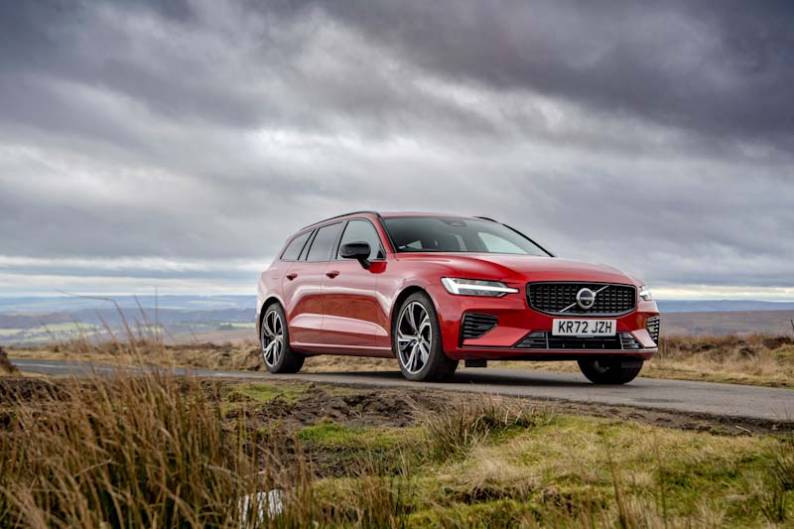
RAC sale – up to 33% off*
• Roadside cover from £5.29 a month†
• We get to most breakdowns in 60 mins or less
• Our patrols fix 4/5 breakdowns on the spot

Volvo's V60 mid-sized premium estate is at its most sophisticated in Recharge Plug-in hybrid form. Jonathan Crouch takes a look.
Ten Second Review
In Recharge T6 plug-in hybrid form, Volvo's V60 mid-sized premium estate combines turbocharging, supercharging and electrification for potentially astonishing efficiency returns, despite this ambitious Swedish model's huge power output. There's a significant price to pay for this technology and you'll need to tailor your motoring life to suit what this car can offer but if you can deal with these caveats, then this is a potentially very likeable package.
Background
If you've resisted the allure of SUVs and you're determined to choose a mid-sized premium-badged estate car, you might expect a near-£50,000 budget to buy you something with a six cylinder petrol or diesel engine. Volvo's Recharge V60 plug-in hybrid model can't offer that, but it can deliver plenty else in compensation.
In return for the relatively high sticker figure, the usual PHEV virtues feature here in a car that has less direct competition than Volvo plug-in models in other market segments. As with the brand's other designs, its technology is based around the 2.0-litre four cylinder engine block that the company's been using for the last decade. Here though, you get it in the most sophisticated form the marque can offer.
Driving Experience
Under the bonnet of this Recharge Plug-in hybrid V60, you'll find a 2.0-litre turbocharged and supercharged petrol engine which is mated to an electric motor sited on the back axle. For this Recharge T6 variant, the only one available on the V60, the engine's output is 253hp, while the electric motor contributes a further 145hp. The whole set-up is aided by a 25bhp starter motor/generator that pitches in from time to time to smooth any gaps in torque delivery between the two main power sources - engine and electric motor.
It's all enough to deliver a set of stats that it's rather hard to get your head around. That big combined power output - close to 400hp - offsets the extra weight of all these mechanicals, so 62mph from rest can be dispatched in just 5.2, though top speed (as with all current Volvos) is limited to 112mph. Alongside all of this is the potential for the kind of fuel and CO2 readings that theoretically could equal those of a frugal supermini.
Which of those two extremes you reach in a Recharge V60 Plug-in model will depend on your choice between the five driving settings that owners of all Volvo Plug-in hybrid models are offered. Ultimate speed is delivered by a 'Power' mode that sees both petrol and electric units permanently working together. Alternatively, there are four other drive choices: a 'Hybrid' setting that sees the two engines cutting in and out as necessary: an 'AWD' mode that gives you permanent 4x4 traction: plus a 'Pure electric' setting that only uses the battery power and is EAER-rated to take you up to 54.1 miles (more than most people's daily commuting distance) on a single charge. There's even a 'Save' option so that on a longer trip, you can hold that charge until you get to the city driving you might have to do at the end of the journey.
Design and Build
This Recharge Plug-in hybrid model looks pretty much identical to the more conventional petrol variants lower down the range. The eagle-eyed will spot special badging and an extra charging flap but that's about it. The original V60 model was quite a departure from the conventional boxy Volvo station wagon shape and this MK2 model continues that trend. To look at, it's very much like the larger V90 estate model that shares its sophisticated 'SPA' architecture. In fact, from a casual glance, you might easily mistake this V60 for its larger stablemate. Get up a little closer though, and you'll find that the front apron is more aggressively styled with this more compact wagon. There's some design inspiration from the XC60 mid-sized SUV in places too. The 'Thor's Hammer' LED headlights for example, though they're a bit more sculpted here, while the front apron is more aggressively styled in comparison to the smooth face of the V90.
Inside, there's much more borrowed from those V90 and XC60 models, the interior boasting Volvo's current pared-back interior design language with a 9.3-inch portrait orientated touchscreen infotainment system. Plus there's a digital instrument panel, with virtual dials separated by a customisable central space that can display a navigational map, trip computer info or your chosen phone or media settings. Out back, boot space isn't compromised by the plug-in system's battery in the way that it is with other rival PHEVs. Capacity comes in at 519-litres with the rear seats in place, outstripping the BMW 3 Series Touring and the Mercedes C-Class Estate. The rear bench splits 40/20/40 and drops down flat to the floor to free up as much as 1,431-litres if you load to the roof.
Market and Model
You'll have expected there to be a price to pay to add in sophisticated plug-in tech to the V60, but you might not have expected it to take the price of this Volvo right up towards £50,000. But that's the reality here. The 253hp T6 version of this Recharge AWD model comes in 'Plus' or top 'Ultimate' trim and costs from around £48,000. That's around £7,000 more than an equivalent front-driven B4 petrol V60 but is a similar amount to that which you'd pay for an equivalent version of this model's closest rivals, the BMW 330e Touring and the Mercedes C300e Estate.
At least every version of this V60 PHEV is very well equipped. As standard, even the 'Plus' variant comes with leather-faced upholstery, LED headlights with active high beam, two-zone climate control with a 'CleanZone' air-filtration system, heated front seats, a powered tailgate and alloy wheels of at least 18-inches in size.
Volvo's Sensus infotainment system is also standard. This brings a 9" portrait-style touch screen, satellite navigation and an intuitive voice-activation system. It also provides access to the internet and a range of cloud-based apps such as Spotify, TuneIn, Stitcher and Yelp. Volvo's City Safety system is fitted to every V60. This includes automatic emergency braking with pedestrian, cyclist and large animal detection, and the world-first application of Steer Assist. This feature helps to avoid or limit the severity of collisions at low speeds by assisting with the steering in an emergency, such as when swerving to miss an obstacle. There's also Pilot Assist, Volvo's innovative semi-autonomous drive feature. This assists with the steering (up to 80mph) and takes care of the acceleration and braking required to keep the car within lane markings and at the desired cruising speed or distance from any vehicle in front.
Cost of Ownership
The Recharge T6 plug-in V60 variant achieves a WLTP-rated all-electric driving range that's EAER-rated at between 31.1 and 54.1 miles, a figure which assumes of course that the car is driven in its 'Pure' all-EV mode. As for the WLTP fuel and CO2 stats, well the Recharge T6 Plug-in hybrid is WLTP-rated for combined economy at between 141.1 and 352.6mpg, which only goes to show just how wildly inaccurate the WLTP testing process is for Plug-in hybrid models. In reality, if you expect the kinds of economy returns you might have expected from a frugally-driven version of the old V60 D4 diesel, you won't be too far out.
Of more use is the officially-quoted WLTP CO2 return - between 18 and 46g/km; the lower figure is what your Benefit-in-Kind taxation will be based upon, which is why this V60 Recharge T6 has a BiK rating of just 8%: compare that to 33% for an equivalent B4 conventional petrol variant. If you're a business buyer browsing in this segment, these are figures that'll reward a bit of thought if you're just about to blindly sign on the dotted line for a conventional six cylinder diesel model from a rival brand.
As with any plug-in hybrid, there's little point in purchase unless you establish a regular recharging regime for the battery pack, which in this case is 11.6kWh in size. Customers will be able to buy a wallbox from Volvo that will charge their cars on 16-amp power in about two and a half hours. If you're out and about and find a 10-amp pubic charging point, the charging time will be slightly longer - three and a half hours - while connecting up to a normal domestic three-pin 6-amp supply will take six hours.
Summary
The sort of buyer likely to be considering an upper-spec V60 diesel model is, we think, likely to be sorely tempted by this Plug-in hybrid version. But will conquest customers be so easily won over? Possibly. BMW's 330e Touring and Mercedes' C300e Estate models represent strong competition to this model but this Volvo can better those rival German-made contenders when it comes to safety provision and equipment. It also arguably has a classier cabin. And it's better equipped - for a slightly lower price. As with any PHEV, the combination of low taxation and the potential for virtually fuel-free commuting mileage is a tempting one. And when you match it all to this car's cool, Scandinavian vibe, the resulting package feels very complete.
On the other hand, the asking figures are substantial and in an era where government assistance is absent, you'd have to be very sold on the plug-in remit here to opt for this Recharge model. After all, if you merely want your premium mid-sized Volvo estate to be in some way electrified, the brand now offers very acceptable mild hybrid petrol versions of this car lower down the range. We think those B3 and B4 variants might be a better pick for most customers. But if you have to have technology superiority in your V60, only the Recharge variants offer it.






